- Home
- S. J. Parris
Giordano Bruno 03 - Sacrilege Page 2
Giordano Bruno 03 - Sacrilege Read online
Page 2
“Here, Bruno.” He poured a cup of small beer and passed it to me. “This weather, the dust sticks in your throat, does it not? It is a little early for good wine, but let us drink to a successful partnership. The manuscript is not your only copy, I trust?”
“No.” I took a welcome sip of beer. Though warm, it was at least fresh-tasting. “I made another which I have locked up at home.”
“Good. Keep it safe. I will guard this with my life, but with so many travelling out of London at this time, there are plenty of cutpurses and bandits on the roads. You do not mean to stay in London, do you?”
“The ambassador would like to move the household near to the court if he can find somewhere. I am in no hurry to leave.” I shrugged. “I see no evidence of plague.”
Charlewood shook his head.
“By the time you’ve seen the evidence, it’s too late. Take my advice—get out of the city. We cannot have you struck down at—what age are you now?”
“Thirty-six.”
“Well, then. You want to be alive to present this book to the queen in person, don’t you? And the next one, and the next. A dead author is no use to me.”
I laughed, but my mind flashed back to that stone rolling in the dust at my feet and the unseen presence that had been haunting my steps for the past days. If my pursuer had his way, I would be lucky to see the autumn, plague or no plague.
I LEFT CHARLEWOOD’S house with a lighter heart, encouraged by his enthusiasm. The streets around the Barbican were still unusually empty, the sun overhead bleaching colour from the red-brick houses that lined the roads. Behind the rows of chimney stacks, the sky was a deep cloudless cobalt, almost as blue as the skies I remembered from childhood over the village of Nola, at the foot of Monte Cicada. I had not known England was capable of such a sky. My shirt stuck to my back with sweat and I loosened the lacing of it at the collar as I walked, glad that I had always avoided the English fashion for wide starched neck-ruffs; the young dandies at court must be desperately uncomfortable in this heat.
As I crossed Aldersgate Street and was about to turn into Long Lane, I sensed it again: a flicker of a shadow, the merest hint of a sound. I spun around, hand to my knife, and for the first time I caught a glimpse of him, perhaps fifty yards away, just before he vanished between two houses. I had no time to make out more than a tall, thin figure, but my blood boiled and before I had given thought to my actions I was hurling myself after him, feet pounding through the dust; if I must fight, so be it, but I would not be made to live this way any longer, always looking over my shoulder, feeling vulnerable at every corner like a hunted creature.
Slipping into the alley where he had disappeared, I spotted the fellow running out of the far end, heading northwards up Aldersgate Street. I forced my legs to a faster pace; I may not be excessively tall like some of these Englishmen, but I am lean and wiry and can move at a clip when I choose. Emerging from between houses, I saw him clearly and realised with a sinking feeling that he was heading towards the Charterhouse. But I was too fired up and too determined to shake him out of this cowardly pursuit to worry about the Howards.
As I drew closer, he scuttled out of sight around the corner, keeping close to the boundary wall that enclosed the maze of old buildings. All I had seen of him was that he wore a brown jerkin and breeches and a cloth cap pulled down low over his ears, but even at a distance he didn’t look like the man I had expected to see, the one I feared was after me—unless the man in question had lost a lot of weight since the previous autumn.
I had no time for such considerations, though; as I rounded the corner, my quarry was attempting to scale a low wall that separated the lane from Pardon Churchyard, the old plague burial ground that formed part of the Charterhouse lands. He threw himself over; I scrambled up in pursuit, landed on the other side, and then I had a clear view of him across the graveyard, with no more buildings to hide behind. He moved nimbly, dodging tussocks of grass and the crumbled remains of old headstones, aiming for the wall on the far side and the backs of the houses on Wilderness Row. With one determined burst of speed, I gained on him enough to grab at his jerkin before he reached the wall. He twisted away, the fabric slipped from between my fingers; my foot turned on a rabbit hole in the bank and I almost fell, but just as he jumped for the wall, I threw myself at him, caught his leg, and pulled him to the ground. He fought viciously, lashing out with his fists, but I was the stronger, and once I had him by the wrists it was no great effort to pin him facedown in the grass and keep him there by kneeling astride him until his struggle subsided and he lay still.
His cap had come off in the tussle but he pressed his face into the grass; I grasped him roughly by the hair and pulled his head up so that I could see his face. I was not sure which of us cried out the louder.
“Gésu Cristo! Sophia?” I looked down, incredulous, into the face of the girl I had known, and briefly fancied myself in love with, more than a year ago in Oxford. I barely recognised her, and not just because her hair was cut short like a boy’s. She had grown so thin that all the bones of her face seemed sharper, and those wide tawny eyes that had been so bewitching were now ringed with dark circles. She muttered something I couldn’t make out, and I leaned closer.
“What?”
“Get off my hair,” she hissed through her teeth.
Startled, I realised I was still gripping her hair in my fist. I released her and her head sank back to the grass, as if it were too heavy to hold up.
“Sophia Underhill,” I repeated in a whisper, hardly daring to speak her name aloud in case she should vanish. “What the Devil …?”
She twisted her face to look up at me, blinked sadly, and looked away.
“No. Sophia Underhill is dead.”
Chapter 2
We walked side by side down Long Lane towards Smithfield Market. She said nothing, her boy’s cap pulled low over her eyes once more, and I did not press her. She seemed so dramatically altered since I had last seen her, waving goodbye to me from an upstairs window in her father’s lodgings, that I could only guess at the circumstances that might have brought her to London in such a state. But I knew that bombarding her with questions would be the surest way to make her retreat from me. I stole a sideways glance as we walked in search of a tavern; her beauty seemed undiminished, even enhanced by her gauntness, because it lent her an air of fragility. I had to remind myself that in Oxford Sophia had not shared my feelings; her heart had been entangled elsewhere. Yet she had come to London to seek me out, or so it appeared. I could only be patient and wait to hear her story, if she was inclined to tell it.
As we neared the marketplace, the bleating and bellowing of livestock rose into the air with the sharp tang of animal dung, fermenting in the heat. Fear of plague had not stopped the business of commerce here, and we made our way around the edge of the pens where cattle and sheep jostled in their confinement and pressed up to the fences, snuffling frantically, while farmers and butchers bartered and haggled over prices. Sophia covered her mouth and nose with her sleeve as we passed the animals; I was more intent on watching where I was putting my feet. At the entrance to St. Sepulchre’s Lane, which the market traders called Pie Corner, gaudy painted tavern signs hung from the houses and a couple of girls waited listlessly in the shade, trays of sweating pies slung around their necks. I indicated the tavern on the corner, under the sign of the Cross Keys. On the threshold, Sophia hesitated and laid a hand on my arm.
“My name is Kit,” she whispered. “I am come to London to look for work, if anyone asks.”
I stopped, my hand on the door, and stared at her, searching her face. These were the first words she had spoken since announcing her own death in the churchyard. She looked back at me with earnest eyes and in that moment I recognised her haunted, fugitive look and cursed myself for being so stupid. She was on the run from something, or someone; this was why she was disguised as a boy. I knew that look only too well; once I had spent three years travelling through Italy unde
r a different name. I understood what it meant to be a fugitive: always moving on, never trusting a soul, never knowing if the next town where you stopped for food or shelter might be the place they finally caught up with you. I nodded briefly, and held the door open for her.
“Well, come on then, Kit. You look as if you need feeding up.”
The tavern was a functional place, catering for the needs of the market traders; the taproom smelled as strongly of animals as the square outside, but I found the corner of a bench by a window and ordered some barley bread and a jug of ale. I leaned back against the wall and watched Sophia as she hunched into herself, tugging her dirty cap farther down and glancing around nervously. When the bread arrived, she tore into it as if she had not eaten in some time. I sipped my ale slowly and waited for her to speak.
“Forgive me,” she said with her mouth full, wiping crumbs away with the back of her hand. “I have forgotten all my manners, as you see. Whatever would my father say?”
There was no mistaking the bitterness in her tone. Her father, the rector of Lincoln College, had disowned her when he discovered she was with child, and sent her to live with an aunt in Kent; this was the last I had heard of her. When I left Oxford she had given me the aunt’s address and asked me to write, but I had never received any reply.
“I wrote to you,” I said, eventually. She looked up and met my gaze.
“I wondered if you did. I had no letters. I expect she burned them all.” Her voice was flat, as if this no longer mattered.
“Your aunt?”
She nodded.
“Do you hear from your parents?”
She stared at me for a moment, then gave a snort of laughter.
“You are joking, I suppose?”
I both wanted and did not want to ask her about the child. She would have expected it in November, so it must be eight months old by now. If it had lived.
“Why did you say you were dead?” I asked, when it became apparent that she was not going to elaborate. She gestured to her clothes.
“Look at me. This is who I am now. The girl you think of as Sophia Underhill no longer exists. She was a fool anyway,” she added, with venom. “A naïve fool, who believed that books and love were all she needed in life. I am glad she is dead. Kit has no such illusions.”
I was shocked by the force of grief and anger in her words, but on reflection I should not have been. She was only twenty and already life had dealt her some cruel blows: her beloved brother had died young, the father of her child was also dead, and her family had abandoned her. A sudden image flashed into my mind, of Sophia running towards me across a garden in Oxford, her long chestnut hair flying out behind her, laughing, eyes bright, hitching up the skirts of her blue dress as she ran. She had been well educated, beyond what was expected of a young woman of her status; her father had planned a respectable marriage for her. But her independent spirit and determination to shape her own life had brought her, in the end, to this.
“You didn’t need to skulk around in the shadows after me, you know,” I said gently, as she ripped into another hunk of bread. “You could have just knocked on my door.”
“On the door of the French embassy? You think they would have received me? Invited me to dinner, perhaps?” She swallowed her mouthful and fixed her eyes on the table. “In any case, I didn’t know if you would want to see me. After everything that happened.” She did not look at me, and her words were barely audible, the scorn melted away. “I told you, I never had any letters from you. I wanted to find out about your situation before I made myself known. I—I was afraid you might not want to know me.”
“Sophia—” It took a supreme effort of self-control not to reach across the table and take her hand in mine. The ferocity of her warning look confirmed that this would not have been welcome. I was finding it difficult to remember that she was supposed to be a boy. “Sorry—Kit. Of course I would not have turned you away. Whatever help you need—if it is in my power to give—”
“You might feel differently when you know the truth,” she mumbled, picking at a splinter of wood on the tabletop.
I leaned closer.
“And what is the truth?”
She looked up and met my eye with a flash of her old defiance.
“I am wanted for murder.”
A long silence followed, filled by the clatter and hubbub of the tap-room and the farmyard noises and shouts from beyond the window. Motes of dust rose and fell in the sunlight that slanted across our end of the table. I continued to stare at Sophia and she did not look away; indeed, I could swear there was a hint of a smile playing at the corners of her mouth. She seemed pleased with the effect of her announcement.
“Whom did you murder?” I asked, when I could bear the silence no longer.
“My husband,” she replied, quick as blinking.
“Your husband?” I stared at her in astonishment.
She smiled briefly. It did not touch her eyes.
“Yes. You did not know I’d got myself a husband, did you?”
I could only go on staring in amazement.
“You are thinking that I don’t waste any time, eh? Barely finished pushing out one man’s child before I’ve married another?”
“I thought no such thing,” I said, uncomfortably, because the idea had fleetingly crossed my mind.
“My aunt sold me like a piece of livestock.” She gestured towards the window. “Like one of those poor bleating beggars in the pens.”
“So you murdered him?” In my efforts to keep my voice down, it came out as a strangled squeak.
Sophia rolled her eyes.
“No, Bruno. I did not. But someone did.”
“Then who?”
This time she could not disguise the impatience in her voice.
“I don’t know, do I? That’s what I want to find out.”
I shook my head, as if to clear it. “Perhaps you had better tell me this story from the beginning.”
She nodded, then drained her tankard and pushed it towards me. The ale was not strong, but drinking it fast had brought a flush of colour to her hollow cheeks.
“I’ll need another drink first.”
“THERE IS NO use in dwelling on all that happened before you left Oxford,” she began, when a fresh jug of ale had been brought and she had finished a second piece of bread. I mumbled agreement, avoiding her eye. I wondered if she remembered the night I had kissed her, or if that memory was buried in all that had happened after. I remembered it still, as sharply as if it had been a moment ago.
“My father sent me away to my aunt in Kent, as you know. My mother cried when I left and promised it was only for a season, until my disgrace, as she put it, was past, but I could see by my father’s face that she was fooling herself. The stain to his reputation and his standing in the town was more than his pride could bear. I truly believe he would rather I had died than brought him a bastard grandchild.”
“He as good as said so to me,” I recalled.
“Well, then. I was under no illusion when I set out to Kent in the company of one of my father’s servants. I had been cast off by my family for good and I had no idea what my future was to hold. It was several days hard riding and I was near four months with the child by then. I was ill the whole way and I feared …” She looked down at the table, suddenly bashful. “I knew so little of such matters, I feared the rough journey would dislodge it before its time. Stupid.” She shook her head, embarrassed.
“Not at all,” I said. “It would be an unnatural woman who did not worry about the safety of her unborn child.”
“It turns out they are tougher than you think, these creatures,” she said, allowing herself a soft smile. “In any event, I was safely delivered to my aunt—my father’s elder sister, so you may imagine she took the insult to his honour very much to heart. She was widowed, with modestly comfortable means, and she made sure that I was adequately fed and housed for the duration of my confinement. But it came at a price. The state of my im
mortal soul was her real project.” She grimaced, and paused to take another gulp of ale. “I was allowed no books except the Bible and a book of prayer. Naturally, I was not permitted to step outside the house—she had told her neighbours that I was sickly and likely to die and that she was nursing me through my last months. Whether they believed her, I have no idea, but I was shut in my room whenever she had visitors.”
“You were not moved to any religious feeling, despite your aunt’s efforts?”
She snorted and tossed her head in a way reminiscent of how she was before, when she still had long hair to toss.
“I told you, Bruno—I am done with religion, of any stripe. If there is a God, I am sure He must look with despair on His representatives, endlessly bickering over trifles. For myself, I would rather live without it.”
“That makes you a heretic,” I said, suppressing a smile.
She shrugged.
“If you say so. It does not seem to have done you any harm.”
“Oh, Sophia. Sorry—Kit. How can you say that? Do not take me as your model. I can never return to my home because I am called a heretic, you know this.”
“Neither can I,” she said, pointedly. “We are in the same boat, you and I, Bruno. We both live in exile now.”
I was tempted to detail for her all the ways in which our situations could not be compared, but I wanted to hear the rest of her story.
“So your aunt was determined to make you repent …?”
“I never knew how much my father had told her of the circumstances that brought me to her house. She was certainly of the belief that I had been wilful and disobedient and had made my long-suffering family pay the price for my dishonour. And she made it very clear that I would have no choice about the life I lived from then on, if I expected to be given food and shelter.” She stopped abruptly, looked away to the window, and swallowed hard. I sensed we were nearing the heart of her story; she had kept up the careless bravado convincingly so far, but I noticed she had barely mentioned the child. Perhaps she found it too painful to talk about.

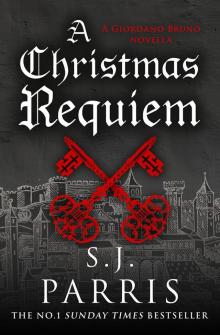 A Christmas Requiem
A Christmas Requiem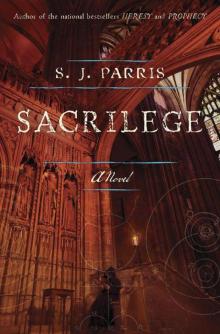 Giordano Bruno 03 - Sacrilege
Giordano Bruno 03 - Sacrilege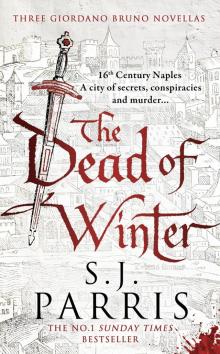 The Dead of Winter: Three gripping Tudor historical crime thriller novellas from a No. 1 Sunday Times bestselling fiction author
The Dead of Winter: Three gripping Tudor historical crime thriller novellas from a No. 1 Sunday Times bestselling fiction author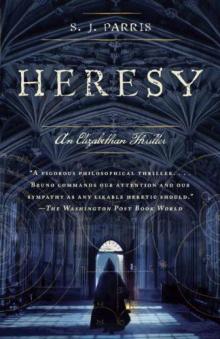 Giordano Bruno 01 - Heresy
Giordano Bruno 01 - Heresy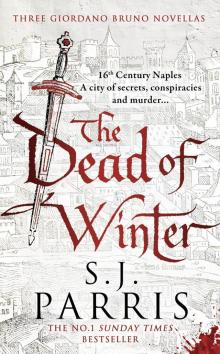 The Dead of Winter
The Dead of Winter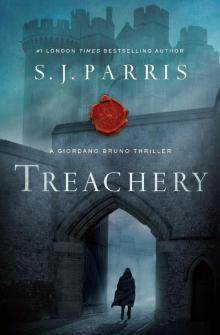 Treachery (2019 Edition)
Treachery (2019 Edition)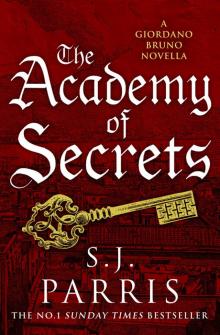 The Academy of Secrets
The Academy of Secrets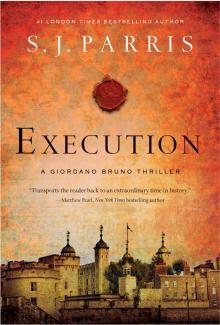 Execution
Execution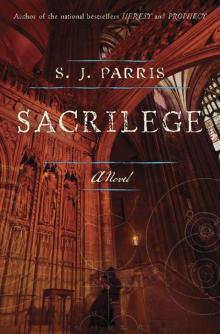 Sacrilege: A Novel
Sacrilege: A Novel Prophecy
Prophecy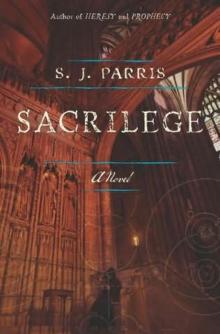 Sacrilege gb-3
Sacrilege gb-3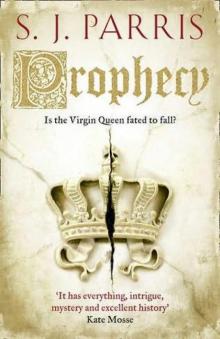 Prophecy (2011)
Prophecy (2011)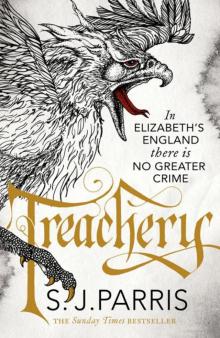 Treachery
Treachery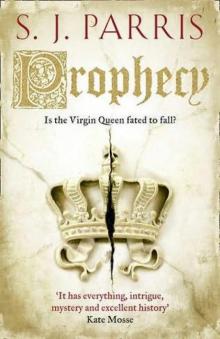 Prophecy gb-2
Prophecy gb-2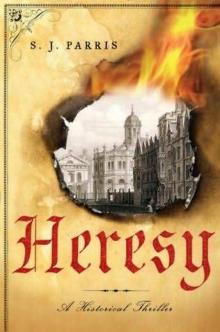 Heresy
Heresy